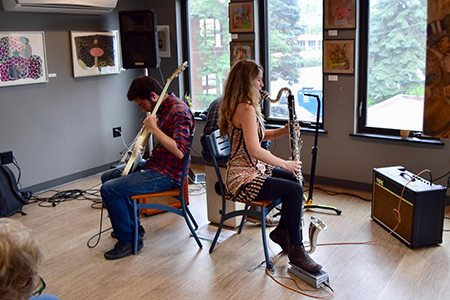by David Kulma

The Pittsburgh group Kamratōn –– flutist Sarah Steranka, oboist Lenny Young, clarinetist Emily Cook, soprano Anna Elder, violinist Jennifer Sternick, and cellist Cecilia Caughman –– opened with two opposite, yet equally strange works. Curtis Rumrill’s creepily humorous In This Styrofoam Room (2017) sets words by Zachary Webber depicting a beetle’s love, and juxtaposes long, static string notes with microtonal woodwind flourishes. Elder precisely emphasized phonemes and melismatic vocal lines that underlined the creepy-crawly insect world. Christine Burke’s 6 fingers/We go there by any road we take (2017) eschewed a text in favor of a glassy atmosphere of surrealist mouth sounds, full of blowing noises, eerie multiphonics, and nearly inaudible trills.
Juxatonal –– soprano Jocelyn Zelasko, cellist Bryan Hayslett, and clarinetist Dawn Marie Hamilton –– began with Sarah Hersh’s In Praise of Continuous New Dreams of New York City (2011), the story of a dreamer’s journey through smells. Hayslett and Zelasko convincingly shaped its modernist melodies and its cabaret mood. Hamilton joined for Jocelyn Hagen’s Gwendolen’s Dream (2006), its gorgeous, modal universe suggested by a love text from a greeting card. Zelasko and Hayslett ended with Steven Knell’s 2012 Anthemoessa, which tells the Greek myth of the end of the sirens. High cello harmonics and regularly-occurring seagull cries punctuated Zelasko’s powerfully- sung storytelling.
A highlight of Juxtatonal’s set was their surprise transition between the first two works. Hamilton suddenly started yelling random numbers from the audience at the end of In Praise, and as she approached the stage, Zelasko and Hayslett joined in with different permutations of the numbers to lead into Hagen’s work.
Chicago-based Fat Pigeon –– bass clarinetist Emily Beisel, percussionist Luis Fernando Amaya, and electric guitarist Craig David Pinson –– delved into the possibilities of collective composition and free improvisation. Page of Tin (2017) focuses on fast vigorous gestures amid soft silences, almost like short earthquakes, with its Dolphyesque bass-clarineting, bowed guitar scrunches, and pounding cajón.
A Feign Opt (2017) was played over a recording of the trio improvising around a static, atmospheric drone. The live trio contributed short one-note attacks, rubbings, and a powerful crescendo that suddenly ground to a halt. At one point, the result was like whale calls deep in the ocean. They ended with a group improvisation, sitting in a small circle and facing outward. The resulting wobbles and long swooping notes — as they relied on their ears instead of their eyes to communicate — created music that allowed time to stop, forcing an intimate contemplation of each passing noise.
Photo of Fat Pigeon by Sophie Benn.
Published on ClevelandClassical.com June 19, 2018.
Click here for a printable copy of this article


